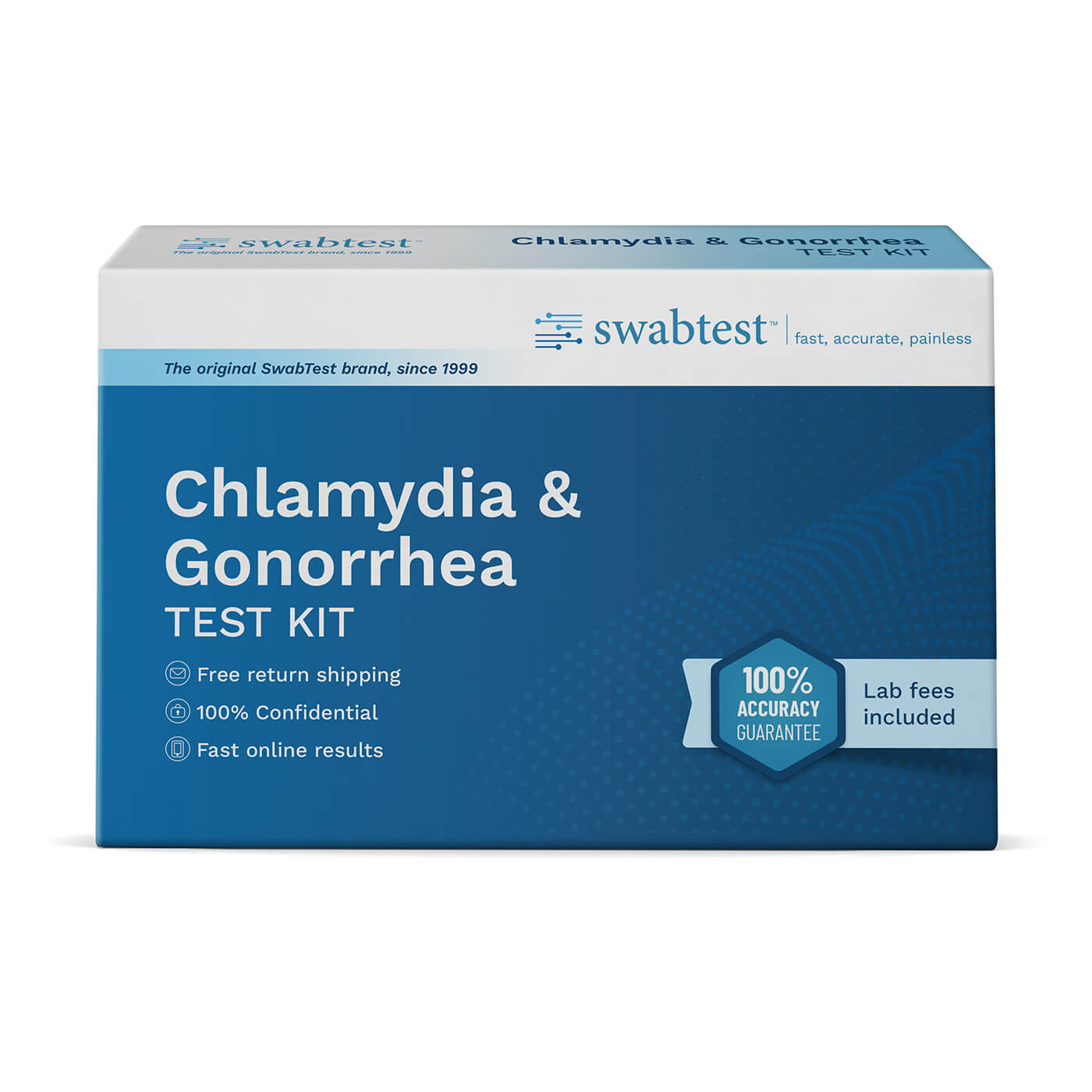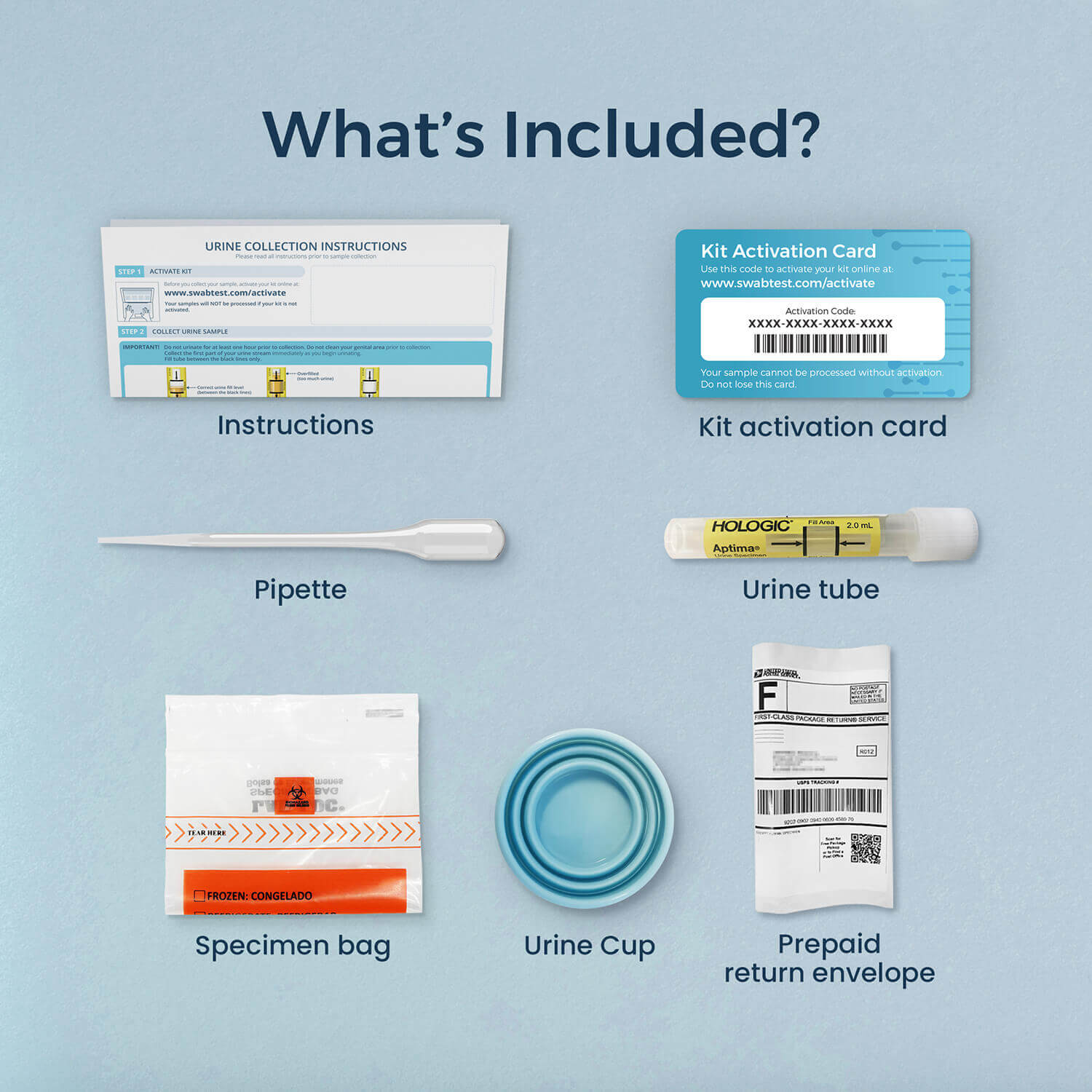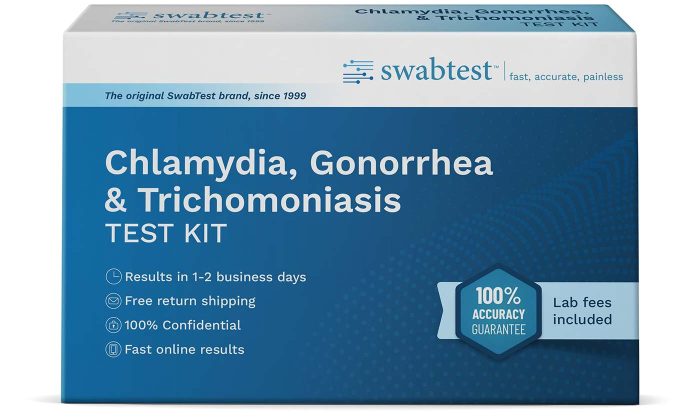Chlamydia & Gonorrhea Test
Chlamydia and Gonorrhea are two sexually transmitted infections caused by bacteria. When detected, they can be easily treated with antibiotics.
- Fast, accurate screening for chlamydia and gonorrhea
- Discreet At-Home Collection
- Secure, Lab-Certified Results
- Simple, At-Home Testing
- 2X testing guarantee
- AABB, ISO17025 & CLIA accredited lab
$79.00 Original price was: $79.00.$49.00Current price is: $49.00.
Description
Chlamydia and gonorrhea are bacterial infections that are transmitted through sexual contact. Many people with these infections do not show symptoms but can pass it along to their partners. When left untreated, these bacterial infections can lead to pelvic inflammatory disease, infertility, ectopic pregnancy, and chronic pelvic pain in women. Untreated men may experience sterility, inflammation of the prostate gland (prostatitis) and the epididymis (epididymitis). During pregnancy, untreated chlamydia infections increase the risk of preterm delivery and untreated gonorrhea infections can increase the risk of miscarriage and inflammation of the uterine lining. Chlamydia and gonorrhea can be passed on from an untreated mother to a newborn during childbirth, putting the baby at risk of pneumonia, and gonorrhea-associated eye infections and sepsis. When detected, both bacterial infections can be easily treated with antibiotics.

Description
Chlamydia and gonorrhea are bacterial infections that are transmitted through sexual contact. Many people with these infections do not show symptoms but can pass it along to their partners. When left untreated, these bacterial infections can lead to pelvic inflammatory disease, infertility, ectopic pregnancy, and chronic pelvic pain in women. Untreated men may experience sterility, inflammation of the prostate gland (prostatitis) and the epididymis (epididymitis). During pregnancy, untreated chlamydia infections increase the risk of preterm delivery and untreated gonorrhea infections can increase the risk of miscarriage and inflammation of the uterine lining. Chlamydia and gonorrhea can be passed on from an untreated mother to a newborn during childbirth, putting the baby at risk of pneumonia, and gonorrhea-associated eye infections and sepsis. When detected, both bacterial infections can be easily treated with antibiotics.

Why consider this test
Consider taking this test if you are:
- Sexually active
- Engage in unprotected sex
- Entering a new relationship
- Experiencing symptoms of a sexually
- transmitted disease (STD)
- With a partner who has tested positive for a STD
If you have been recently exposed to chlamydia or gonorrhea, it should be noted that there is a “window period” of about two weeks between exposure and when the lab assays can detect bacteria responsible for these two common STDs
What's included
Chlamydia is caused by the bacteria Chlamydia trachomatis and gonorrhea is caused by the bacteria Neisseria gonorrhoeae. Nucleic acid amplification testing of vaginal swabs and/or urine specimens are used to diagnose chlamydia and gonorrhea infections.
Symptoms of chlamydia and gonorrhea
Symptoms in Females
- Endocervical bleeding
- Increased urinary frequency
- Rectal pain, swelling & bleeding
- Painful urination
- Vaginal discharge
Symptoms in Males
- Testicular pain & swelling
- Increased urinary frequency
- Rectal pain, swelling & bleeding
- Painful urination
- Painful urination
Related Products
Related products
-
Shop All
DNA Paternity Test
The definitive way to establish paternity for a father and child.
$180.00Original price was: $180.00.$99.00Current price is: $99.00. Select options This product has multiple variants. The options may be chosen on the product page -
Health & Wellness
DNA Cardiovascular Health Risk Test
$349.00 Add to cartUnderstand your genetic risk for heart-related conditions.
-
Health & Wellness
DNA Hemochromatosis Test
$195.00 Add to cartFind out if you are at risk of hereditary hemochromatosis.
-
Health & Wellness
DNA Thrombotic Risk Test
$195.00 Add to cartFind out your genetic risk of developing abnormal blood clots
Related Products
$149.00 Original price was: $149.00.$99.00Current price is: $99.00.
$271.00 Original price was: $271.00.$149.00Current price is: $149.00.
Related products
-
Health & Wellness
DNA Thrombotic Risk Test
$195.00Find out your genetic risk of developing abnormal blood clots
-
Health & Wellness
DNA Cardiovascular Disease (ApoE) Test
$195.00Detects the APOE variant linked to late-onset Alzheimer’s
-
Sexual Health
Common STD Test
Screens for chlamydia, gonorrhea and trichomoniasis infections
$99.00Original price was: $99.00.$79.00Current price is: $79.00. -
Shop All
DNA Paternity Test
The definitive way to establish paternity for a father and child.
$180.00Original price was: $180.00.$99.00Current price is: $99.00. This product has multiple variants. The options may be chosen on the product page
To take a urine sample, use the collection cup provided and transfer a small amount of the urine into the sample vial.Place your sample in the specimen bag provided and mail it back to the lab using the prepaid envelope inside the kit.
Several different diagnostic tests are available for chlamydia and gonorrhea. Our lab uses a molecular testing technique known as nucleic acid amplification test (NAAT), which detects the presence of bacterial DNA from a urine sample or a vaginal swab. NAAT tests are the most sensitive and can be performed rapidly.
Chlamydia and gonorrhea are common STDs, particularly in individuals aged between 15 and 24 years, but many infected individuals remain asymptomatic. Testing is simple and non-invasive. Treatment is simple and effective and will prevent any complications associated with these STDs.
Yes. Although antibiotic treatment is effective for the current bacterial infection, it does not prevent future infections through exposure to an infected individual.
Contact a health professional to begin a course of prescribed antibiotics as soon as possible. Abstain from sexual contact until the completion of the antibiotic course. Ensure that any recent sexual partners are aware of your diagnosis so they can also request testing.
Chlamydia is easily treated with antibiotics. Gonorrhea is easily treated with dual antibiotics. If your test is positive, talk to your healthcare provider. Refrain from sexual activity until your antibiotic course is completed. If your symptoms do not subside after a few days of taking antibiotics, visit your healthcare provider.
It is important to complete your antibiotic treatment, since inappropriately treated partners can pass on the disease. Repeat infections are common, particularly in women. Multiple infections in women can lead to reproductive complications.












